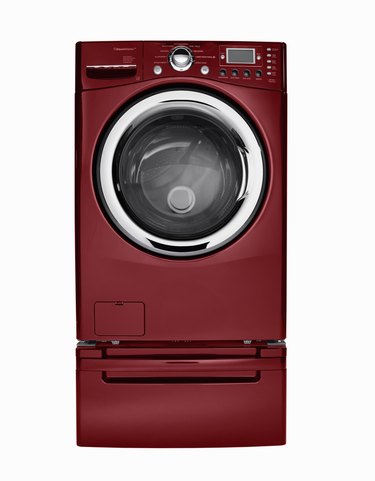
If you keep your washing machine in a place where temperatures dip below freezing, such as a garage or in an RV, you put your machine at risk for damage from frozen water. Knowing how freezing can hurt your washer and knowing how to prevent this damage will help your appliance last a long time.
Water Expansion
Video of the Day
When the temperature in your washing machine drops below 32 degrees Fahrenheit, water inside the machine will begin to freeze. This means the liquid turns to solid and in doing so will expand a great deal. Since the water is often in a confined space inside the washer, the expanding ice can cause various parts to crack or break under the pressure of the expanding solid. The pump, hoses and various other parts that contain even a small amount of water could burst just as water pipes in a home will burst when frozen. This will lead to leaks and serious damage to the machine that will have to be repaired before its next use.
Video of the Day
Draining Water
One of the most effective ways to protect your washer from freeze damage is to empty it of water completely. If there is no water in the machine, there is nothing to freeze and the cold should not damage the unit. You will need to unhook the water supply lines. Run a spin cycle to force out as much water as possible and disconnect the drain line as well. You may need to tip the machine back and forth a bit to drain any trapped water. If you want to be thorough, use compressed air to blow the lines out completely and dry out the inside of the tub by hand.
Hot Water Solution
You may not wish to unhook your hoses and dry out your machine because you need to use it for laundry regardless of the temperatures. If your washer is used for your regular laundry needs and you can't go without it during a cold snap, use it regularly to prevent freezing. Turn the water on the "hot" setting and run it occasionally, even on days when you have no laundry to do. The hot water will keep any ice from forming.
Winterizing
If the washing machine in question is in a vacation home or in an RV, or if you'll be away an extended period during cold weather, you'll need to winterize it. Made for the drinking water system in a recreational vehicle, specially formulated non-toxic antifreeze can be run through your washer. Pour the product in and run a cycle to fill the lines with this antifreeze. When you no longer need it, run an empty load with some detergent to wash it out through the drain lines.
Shut Off Supply
When you are going to be away for a while and freezing is a possibility, make sure you shut off the water supply to your washing machine and other appliances entirely. Unlike a faucet, you can't leave a washer dripping to prevent freezing.